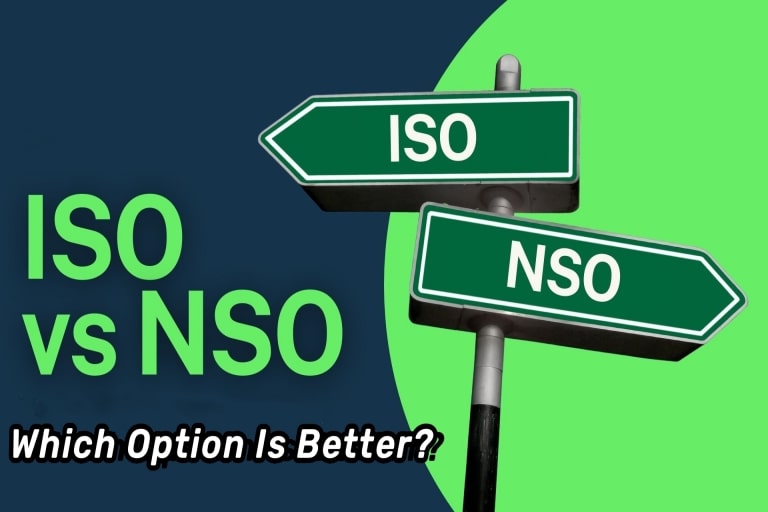
Employees’ compensation involves more options than the monthly salary, and regularly compensated and rewarded employees are more likely to be productive and loyal.
Equity compensation is a popular form of non-cash benefits offered to employees and other stakeholders to show appreciation or celebrate professional milestones. It’s actually one of the first benefits that employees consider when they’re comparing various job opportunities.
This article will dig deeper into the comparison of ISO vs NSO. Which one is better? How are they both taxed? So, if you want to know the answers to these questions, keep reading.
Why Are Stock Options Popular?
Of all compensation forms, stock options are quite popular. They grant employees the right to buy future stocks at a fixed price, regardless of the market price at the time of exercising.
As a result, they allow employees to invest in the company. They can wait until the prices rise and then sell the stocks. This way, employees know they’re part of the company’s success, and their productivity can result in financial gains other than their monthly compensation.
Both ISOs and NSOs are subject to vesting or a waiting period. After this period, the recipient will have control over the stock and can buy or sell the company’s shares.
Recipients get to buy the shares at a fixed price and can sell them for a profit. During the vesting period, ISOs and NSOs aren’t subject to taxing.
What are ISOs?
Incentive Stock Options, or ISOs, are always granted to company employees. They are issued by corporations, expire after ten years, and are subject to a vesting period. They can also expire if you leave the company or according to the contract terms.
If the employee is allowed to keep them, they should be exercised three months after the termination date.
Also called statutory stock options, employees don’t pay any taxes when they exercise these corporate benefits, but they are subject to taxes when they sell them. The profit on ISOs is usually taxed at the capital gains rate, which is only due when the options are sold.
Employees can exercise these ISOs by paying cash to buy stock or through cashless exercise. The latter is primarily available for publicly traded shares and happens when you don’t have enough money to buy stock, so you receive a short-term loan with the help of a broker.
After buying the shares, they’re immediately sold at a higher price to repay part or whole of the loan and the commissions.
Pros
- Employees are allowed to buy shares at a price lower than the market price, so they result in an immediate profit.
- ISOs receive favorable tax treatment.
- They pay long-term capital gains.
Cons
- ISOs can only be granted to employees but not to service providers.
- They should be held for a vesting period of two years after being granted, and the shares should be kept for one year after being exercised.
- Employees can only exercise $100,000 worth of ISOs in a calendar year.
- ISOs can only be transferred to someone else upon death.
What are NSOs?

Unlike ISOs, non-qualified stock options, or NSOs, can be issued to other stakeholders. They’re not exclusive to employees but can be issued to consultants, vendors, other service providers, and directors. As a result, they’re more flexible than ISOs.
Partnerships, LLCs, and corporations can issue NCOs. NSOs are more flexible than ISOs but don’t receive the same tax-favorable treatment. As a result, they are taxed at the ordinary income tax rate upon exercise, but there’s no limit to the number of NSOs that can be issued in a single year.
When exercised, the granting entity is subject to a tax deduction. They are taxed at ordinary tax income upon exercise. When a company doesn’t meet the requirements for issuing ISOs, it usually issues NSOs instead. In the case of termination, the employer can exercise them up to the expiration date.
Pros
- NSOs are issued to different stakeholders other than employees.
- Employees can still have ownership of their NSOs, even if they quit or continue to work for the company as vendors or service providers.
- They might include an early exercise feature.
- There’s no Alternative Minimum Tax or ATM.
- There’s no maximum value to be exercised.
- There could be a special term that controls the transfer of NSOs, apart from the death of the person to whom the NSOs were granted in the first place.
Cons
- Although taxing is less complicated, NSOs are subject to higher taxes.
- You receive less money upfront because the employer has to pay payroll taxes on the income you receive.
- You pay taxes in the year of exercise, even if you don’t sell your shares.
Which is Better: ISOs vs NSOs?
There isn’t one solution that fits all, and choosing between ISOs and NSOs depends on several factors. These include the type of business, its size, its goals, and employees’ concerns. As for individuals, they should think about their income, tax situation, and investment goals if they’re given the opportunity to pick between ISOs and NSOs.
Many corporations offer ISOs because they offer fantastic tax benefits. They allow for lower tax rates, giving employees a higher profit potential.
Yet, several drawbacks make NSOs more favorable. The first one is that they can be granted to different stakeholders, not just the company’s employees. Moreover, they don’t have special holding requirements or Alternative Minimum Tax. Nevertheless, the income tax calculated is usually higher.
Most people, however, will choose NSOs if they’re given the chance, especially if they’re uncertain about the stock performance. Thanks to their simplicity and flexibility, NSOs provide more control over cash flow.
Wrap Up
ISOs and NSOs are two types of equity compensation, but they’re different in how they perform. ISOs are strictly issued to the company’s employees and expire in ten years, whether exercised or not.
NSOs are more flexible and can be issued to other stakeholders. They’re more flexible with fewer restrictions during the vesting period but are taxed at a higher rate.
Nevertheless, many people choose NSOs over ISOs because the latter are only issued by corporations. Startups, LLCs, and partnerships prefer NSOs, which can be issued to employees, service providers, and vendors.




